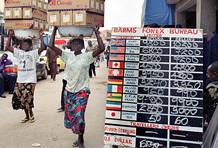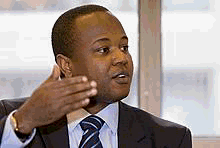
Typical street scene in Santa Ana, El Salvador. (Photo: iStock)
IMF Survey: IMF Helps Ghana Learn From Others on Inflation Targets
February 14, 2008
- Ghana draws on IMF's broad, cross-country perspective
- Emerging economies serve as best models
- Fiscal discipline will be key to Ghana's continued success
In May 2007, Ghana formally adopted an inflation targeting framework for its monetary policy, announcing price stability as the central bank's primary objective.

Two street vendors in Accra, Ghana: the country's pursuit of sound economic policies has helped cut the poverty rate in half over the past decade. (photo: Issouf Sanogo/AFP).
Cross-country sharing
Only the second country in sub-Saharan Africa to adopt such a regime (after South Africa), Ghana has few regional models to follow, so the authorities have decided to draw on the experiences of a wide cross section of other countries.
"We've had bilateral assistance on inflation targeting from the Bank of England and others, but we thought it was time to see how other countries have been doing it," said Maxwell Opoku-Afari, Advisor to the Governor of the Bank of Ghana, during a recent visit to the IMF. The four-person delegation studied the inflation targeting models used in Brazil, Turkey, South Africa, Chile, and other countries.
Turning point
At the beginning of the decade, Ghana was grappling with high inflation, large fiscal and external account deficits, and high external and domestic debt. In 1998-99, the country registered a poverty rate of around 58 percent.

Maxwell Opoku-Afari, Advisor to the Governor of the Bank of Ghana, visited the IMF to get comparative information on inflation targeting. (photo: IMF)
The turning point, according to Opoku-Afari, came in 2002, when the authorities introduced a new monetary and fiscal policy framework. The Bank of Ghana Act 2002 gave operational independence to the central bank, established an implicit inflation targeting framework, and created a Monetary Policy Committee (MPC) to oversee the new policy.
Under Ghana's inflation targeting regime, the monetary and fiscal authorities have made a joint institutional commitment to price stability as the primary goal of monetary policy, to which all other goals are subordinated. The numerical target range for inflation is announced in the context of the annual budget and the Bank of Ghana communicates on a regular basis with the public and the markets about its goals and decisions. The current medium-term goal is around 5 percent inflation.
Because this monetary policy strategy is highly transparent, the central bank faces a greater degree of accountability for reaching its inflation targets than it otherwise would. As the inflation target is agreed jointly with Ghana's Ministry of Finance, the accountability of the latter also increases.
"The anchor of our new macroeconomic framework was a reduction in domestic debt," Opoku-Afari said. "As domestic debt decreased from about 31 percent of GDP in 2001 to 13.5 percent in 2006, we also saw inflation come down from about 62 percent in 2001 to around 12.7 percent today." Ghana's five-year success with "implicit" inflation targeting—when a country establishes inflation targets but does not announce this as its primary monetary policy objective—encouraged the government to formally adopt the policy in 2007.
Cross-country comparisons
Opoku-Afari noted that his team's weeklong visit to draw on the IMF's cross-country experience yielded valuable lessons, information, and much insight. "One lesson that has come out strongly for most of the countries is the role of fiscal policy in trying to break the single-digit [inflation] barrier," he said. Brazil and Chile represent particularly important case studies in inflation targeting, he said, as these countries have fiscal responsibility laws similar to the one Ghana has announced it will introduce. Opoku-Afari and his colleagues are paying close attention to how these laws were formulated, assessing what might work for Ghana.
Studying South Africa's well-established inflation targeting system and Nigeria's experience is also useful, Opoku-Afari said. Although Nigeria has not yet formally adopted inflation targeting, the authorities have looked at an IMF-developed model. He noted that with Ghana's discovery of oil last summer, some aspects of Nigeria's experience as an oil-exporting country will, in time, become relevant. "The analysis is a bit different from Ghana now, but in 3 to 4 years, Ghana will be in a similar position because it will have begun factoring in the oil revenue."
Turkey's experience with inflation targeting is another example that Ghana is observing closely. "There's a lot to learn from how Turkey was able to bring inflation down to below 10 percent because that economy has similar structures and similar challenges to ours," Opoku-Afari said.
"Frontier" emerging market
Most of the economies whose experiences Ghana is studying are emerging market countries. "Ghana is no longer a typical low-income country," noted Piroska M. Nagy, the IMF mission chief for the country. "It's not yet an emerging market, but it's in transition. It's at the frontier."
Ghana's economy has been growing at an average of over 6 percent a year and, with lower inflation, better fiscal discipline, and slightly higher growth—around 7.5-8 percent a year—the Ghanaian government could meet its goal of achieving middle-income status by 2015. With poverty now less than half its level of the late 1990s, Ghana is on track to meet the Millennium Development Goal for poverty reduction.
Bond issue
But high growth is not to be taken for granted. To spur growth, and in the absence of major scaling up of aid, the Ghanaian government issued a $750 million sovereign bond in late 2007 to bring in the resources necessary for infrastructure investment. The funds will be spent on energy and transport infrastructure—what Opoku-Afari terms "growth-catalytic" areas—to be developed through public-private partnerships.
While there is some risk associated with taking on more debt, especially for a country that just a few years ago benefited from massive debt relief under the Heavily Indebted Poor Countries and the Multilateral Debt Relief Initiatives, the potential gains from the investment are large. The government remains vigilant to preserve its newfound debt sustainability, and its macroeconomic policy now focuses on keeping Ghana's total debt—both external and domestic—sustainable.
Comments on this article should be sent to imfsurvey@imf.org.


